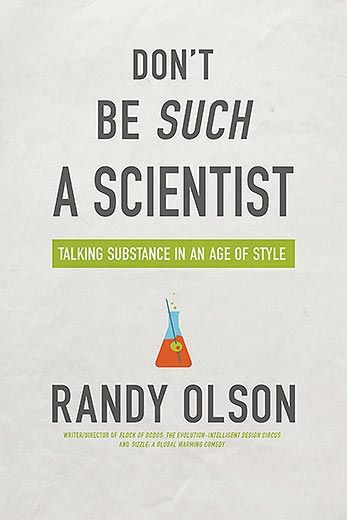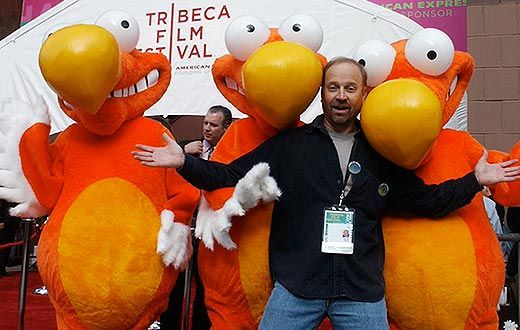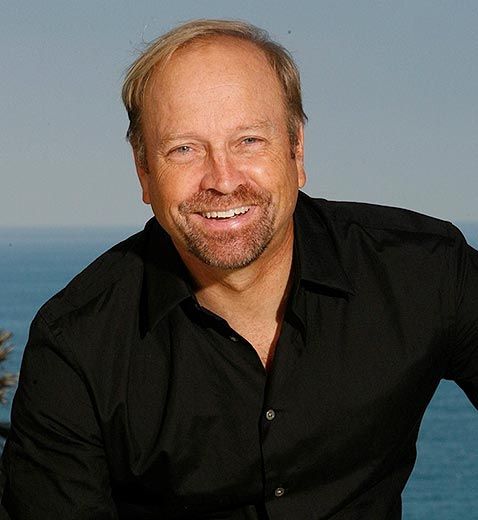Are Scientists or Moviemakers the Bigger Dodos?
Scientist-turned-filmmaker Randy Olson says that academics must be more like Hollywood in how they share their love for science
/https://tf-cmsv2-smithsonianmag-media.s3.amazonaws.com/filer/Randy-Olson-Flock-of-Dodos-631.jpg)
Randy Olson, a tenured marine biology professor-turned-Hollywood filmmaker, has caught some flack for allegedly “dumbing down” science in his two movies. In his new book, Don’t Be Such A Scientist, he challenges that claim and teaches others how to harness the power of arousal.
You were a tenured professor at the University of New Hampshire and you left to pursue filmmaking in Hollywood. Why?
Storytelling. As I look back on the past 30 years, I realize that the single biggest thing that drew me into science were great scientists who told great stories that caught my attention and enraptured me. I went off and did science for a long time and thoroughly enjoyed it, and then I really enjoyed eventually telling my own stories. I got so wrapped up in that that I got sidelined into a whole, separate aspect of that which is telling the stories for their own sake. That’s what drew me into filmmaking in the early ’90s. The deeper I got into that, the more serious I became and finally decided to go to film school in the mid ’90s. That’s when I changed careers.
But you started making films before you changed careers.
Yes. Shortly after I became a professor at the University of New Hampshire, I began making films. In 1989, I had my first kind of life altering experience where I began to see the power of video as a communication device. Not so much to communicate information but rather to grab people’s attention… to arouse and fulfill. Video and film have enormous arousal potential if used properly.
What’s this “arouse and fulfill” thing?
It’s such a simple pairing of elements yet it’s just endlessly difficult and important. The vast majority of academics can’t even figure out how to do the arousal part. All they know how to do is stand up and spew out information. Having lived in Hollywood for 15 years, I can say that the vast majority of Hollywood people only know how to do the first part. They can arouse the hell out of you, but when you finally get interested in what they have to say, you find out they got no clue, no substance, nothing to fulfill with. The goal is to hit it on both of those points. Get the audience really interested and then give them exactly what they’re interested in. The further I’ve gone in this process, the more I’ve come to realize that those two elements are really 99 percent of the entire dynamic of how to communicate.
When you originally went to Hollywood, did you want to make science films?
I was interested in eventually fulfilling, but for the near term developing my capabilities for arousing. So I headed off to film school to learn comedy filmmaking. I have a kind of crazy sense of humor at times, and I enjoy comedy. When I started making films, I began with humorous films. So I was headed in that direction, and I was interested in the power of both humor and film to arouse people’s interests and stimulate their interests in subjects. I did have the long-term interest in circling back around to the science world and, of course, all those years of training and knowledge, I wasn’t about to throw that away.
In your film, Flock of Dodos, you refer to yourself as a dodo.
Oh yes, I definitely do.
So, who are the dodos?
I think for starters, everybody in our society today is a bunch of dodos. We’ve gotten so overloaded with information that there’s no way that anyone can be that smart. Show me the best scholar and the greatest intellect, and I’ll show you a person who’s probably totally clueless on pop culture. And vice versa. There’s such a breadth of information that we’re all clueless at one level or another. The irony of the movie is that most people when they saw the title assumed that it was referring to creationists and intelligent designers. And that it was an insulting or pejorative title. But in fact, once you watch the movie it’s basically hinting that it’s quite possible that these heavily educated intellectuals could be just as big of dodos.
Your second film, Sizzle, about global warming, received some mixed reviews, right?
Well, the reviews were not mixed in the entertainment world, but the reviews were mixed in the science world. It’s important to point out the distinction. We show the movie to broad audiences. Everybody laughs and has a good time with it. But there was a significant number in the science crowd, particularly science bloggers, who were infuriated by the movie. They felt that the proper type of movie to make is an Al Gore type of movie that is packed full of information. My feeling is that that is simply reflective of scientists’ lack of understanding of the way in which to use film. Film is not a particularly effective educational medium. It is an incredibly powerful motivational medium. It’s a great way to reach inside of people’s hearts and their guts and everything else. But it’s not a good medium to pack full of information.
So, your films are more about getting people interested rather than actually educating them on that topic?
Absolutely. I’m not interested in education. I’m interested in motivation and trying to light a fire inside of people to make them want to learn a few things about what they just got interested in.
And scientists don’t get that?
I tried to make a movie that was in a voice that younger, less committed audiences might be willing to listen to. And that is simply not the same audience as the scientists. If you make a film in French and all the Greek people get mad because they couldn’t understand it. Is that because you didn’t make the right film? That wasn’t the intended audience.
How do you respond to people who say you’re “dumbing down” science?
I tell them that they’re being dumb. They don’t understand the difference between “dumbing down” and concision. “Dumbing down” is just chopping down information and throwing it away to lighten the load. Concision is taking the same information and taking a lot of time and energy to rearrange it until you finally get it in a format that is more easily digested and understood than what you had in the beginning. The nice thing now is that I’ve been through three years of two movies, Flocks of Dodos and Sizzle, in which lots of people missed the message and got all wound up because it was film and that’s not their language. Now, it’s like I’ve aroused a lot of interest through the two movies. Now I’m fulfilling the message with the book.
Is your book just for scientists?
Oh no. We have a little video on our website, and I open it by saying that this is a book that could be just as well for lawyers or doctors or accountants, anybody that deals with trying to communicate a lot of information to the broader audience. I do think it’s advantageous to anybody involved in the broad communication of information.


